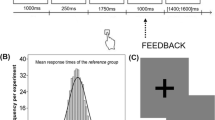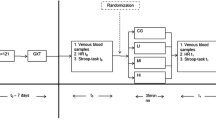Abstract
Rationale
Recent studies have shown that serotonin might be involved in performance monitoring, although the results have been inconclusive. Inconsistent results might be related to the type of pharmacological manipulation and the used behavioral and physiological measures.
Objectives
The present study aimed at further specifying the role of serotonin in performance monitoring.
Materials and methods
The effect of serotonin on performance monitoring was studied by using acute tryptophan depletion (ATD), a well-known method to transiently lower central serotonin levels. Twenty healthy male volunteers performed a time-estimation task and their event-related brain potential (ERP), behavioral, and cardiac responses to feedback stimuli were measured. Furthermore, subjective mood and amino-acid levels were determined.
Results
As expected, ATD did not affect mood and lowered tryptophan levels. ATD attenuated cardiac slowing to negative feedback but did not affect responses to positive feedback, ERPs, and performance measures.
Conclusions
The data point in the direction of a dissociation between cardiac and electro-cortical responses. Cardiac responses appear to be more sensitive to changes in serotonin metabolism and appear to reflect different aspects of the feedback stimulus. The phasic cardiac response appears to be an important measure that provides additional information about the impact of feedback stimuli and serotonergic functioning.


Similar content being viewed by others
Notes
In addition to these analyses, negative feedback followed by a correct adjustment was compared with negative feedback followed by an incorrect adjustment. This analysis revealed a stronger HR deceleration on negative feedback stimuli, which were followed by correct adjustments. This has also been reported in several other studies (van der Veen et al. 2004b; Crone et al. 2003). ATD did not interact with this effect.
To be sure not to miss any interesting effects, we performed some additional analyses. First, we changed the interval in which we determined the maximal difference between negative and positive feedback or the mean amplitude for negative feedback. We used both a longer interval (200–450 ms) and a later interval (300–450 ms). Furthermore, we also examined effects for different electrodes (Fz, Pz). Finally, we examined P3 amplitude by computing the maximal amplitude on Pz in an interval between 250 and 500 ms after onset of positive or negative feedback. All these additional analyses did not reveal any significant effects of ATD.
References
Asberg M, Thoren P, Traskman L, Bertilsson L, Ringberger V (1976) “Serotonin depression”—a biochemical subgroup within the affective disorders? Science 191:478–480
Benkelfat C, Ellenbogen MA, Dean P, Palmour RM, Young SN (1994) Mood-lowering effect of tryptophan depletion. Enhanced susceptibility in young men at genetic risk for major affective disorders. Arch Gen Psychiatry 51:687–697
Cools R, Robinson OJ, Sahakian B (2007) Acute tryptophan depletion in healthy volunteers enhances punishment prediction but does not affect reward prediction. Neuropsychopharmacology. http://www.ncbi.nlm.nih.gov/pubmed/17940553?ordinalpos=1&itool=EntrezSystem2.PEntrez.Pubmed.Pubmed_ResultsPanel.Pubmed_RVDocSum
Crone EA, van der Veen FM, van der Molen MW, van Beek B (2003) Cardiac deceleration following meaningful negative feedback. Biol Psychol 64:151–165
Crone EA, Jennings JR, Van der Molen MW (2004) Developmental change in feedback processing as reflected by phasic heart rate changes. Dev Psychol 40:1228–1238
Crone EA, Bunge SA, de Klerk P, van der Molen MW (2005) Cardiac concomitants of performance monitoring: context dependence and individual differences. Brain Res Cogn Brain Res 23:93–106
De Bruijn ER, Hulstijn W, Verkes RJ, Ruigt GS, Sabbe BG (2004) Drug-induced stimulation and suppression of action monitoring in healthy volunteers. Psychopharmacology (Berl) 177:151–160
De Bruijn ER, Sabbe BG, Hulstijn W, Ruigt GS, Verkes RJ (2006) Effects of antipsychotic and antidepressant drugs on action monitoring in healthy volunteers. Brain Res 1105:122–129
Delgado PL, Charney DS, Price LH, Aghajanian GK, Landis H, Heninger GR (1990) Serotonin function and the mechanism of antidepressant action. Arch Gen Psychiatry 47:411–418
Delorme A, Makeig S (2004) EEGLAB: an open source toolbox for analysis of single-trial EEG dynamics including independent component analysis. J Neurosci Methods 134:9–21
Elliott R, Sahakian BJ, Michael A, Paykel ES, Dolan RJ (1998) Abnormal neural response to feedback on planning and guessing tasks in patients with unipolar depression. Psychol Med 28:559–571
Evers EA, Cools R, Clark L, van der Veen FM, Jolles J, Sahakian BJ, Robbins TW (2005) Serotonergic modulation of prefrontal cortex during negative feedback in probabilistic reversal learning. Neuropsychopharmacology 30:1138–1147
Evers EA, van der Veen FM, van Deursen JA, Schmitt JA, Deutz NE, Jolles J (2006a) The effect of acute tryptophan depletion on the BOLD response during performance monitoring and response inhibition in healthy male volunteers. Psychopharmacology (Berl) 187:200–208
Evers EA, van der Veen FM, Jolles J, Deutz NE, Schmitt JA (2006b) Acute tryptophan depletion improves performance and modulates the BOLD response during a Stroop task in healthy females. Neuroimage 32:248–255
Evers EA, van der Veen FM, Fekkes D, Jolles J (2007) Serotonin and cognitive flexibility: Neuroimaging studies into the effect of acute tryptophan depletion in healthy volunteers. Curr Med Chem 14:2989–2995
Fallgatter AJ, Herrmann MJ, Roemmler J, Ehlis AC, Wagener A, Heidrich A, Ortega G, Zeng Y, Lesch KP (2004) Allelic variation of serotonin transporter function modulates the brain electrical response for error processing. Neuropsychopharmacology 29:1506–1511
Falkenstein M, Hohnsbein J, Hoormann J, Blanke L (1990) Effects of errors in choice reaction tasks on the ERP under focused and divided attention. In Brunia C, Gaillard A, Kok A (eds) Psychophysiological brain research. Tilburg University Press, Tilburg, the Netherlands, pp 192–195
Falkenstein M, Hoormann J, Christ S, Hohnsbein J (2000) ERP components on reaction errors and their functional significance: a tutorial. Biol Psychol 51:87–107
Fernstrom MH, Fernstrom JD (1995) Brain tryptophan concentrations and serotonin synthesis remain responsive to food consumption after the ingestion of sequential meals. Am J Clin Nutr 61:312–319
Gehring WJ, Coles MG, Meyer DE, Donchin E (1995) A brain potential manifestation of error-related processing. Electroencephalogr Clin Neurophysiol Suppl 44:261–272
Gehring WJ, Himle J, Nisenson LG (2000) Action-monitoring dysfunction in obsessive-compulsive disorder. Psychol Sci 11:1–6
Groen Y, Wijers AA, Mulder LJ, Minderaa RB, Althaus M (2007) Physiological correlates of learning by performance feedback in children: a study of EEG event-related potentials and evoked heart rate. Biol Psychol 76:174–187
Hajcak G, Simons RF (2002) Error-related brain activity in obsessive-compulsive undergraduates. Psychiatry Res 110:63–72
Hajcak G, McDonald N, Simons RF (2003a) Anxiety and error-related brain activity. Biol Psychol 64:77–90
Hajcak G, McDonald N, Simons RF (2003b) To err is autonomic: error-related brain potentials, ANS activity, and post-error compensatory behavior. Psychophysiology 40:895–903
Hariri AR, Holmes A (2006) Genetics of emotional regulation: the role of the serotonin transporter in neural function. Trends Cogn Sci 10:182–191
Holroyd CB, Coles MG (2002) The neural basis of human error processing: reinforcement learning, dopamine, and the error-related negativity. Psychol Rev 109:679–709
Jennings JR, van der Molen MW, van der Veen FM, Debski KB (2002) The influence of preparatory set on the speed of responses to perceptually compatible and incompatible stimuli. Psychophysiology 39:496–504
Johannes S, Wieringa BM, Nager W, Dengler R, Munte TF (2001) Oxazepam alters action monitoring. Psychopharmacology (Berl) 155:100–106
Jordan D (2005) Vagal control of the heart: central serotonergic (5-HT) mechanisms. Exp Physiol 90:175–181
Klaassen T, Riedel WJ, van Someren A, Deutz NE, Honig A, van Praag HM (1999) Mood effects of 24-hour tryptophan depletion in healthy first-degree relatives of patients with affective disorders. Biol Psychiatry 46:489–497
Maes M, Meltzer HY (1995) The serotonin hypothesis of major depression. In: Bloom FE, Kupfer DJ (eds) Psychopharmacology: the fourth generation of progress. Raven, New York, pp 933–944
Makeig S, Debener S, Onton J, Delorme A (2004) Mining event-related brain dynamics. Trends Cogn Sci 8:204–210
McNair DM, Lorr M, Droppelman LF (1988) Manual for the profile of mood states. Educational and industrial testing service. California, San Diego
Micallef J, Blin O (2001) Neurobiology and clinical pharmacology of obsessive-compulsive disorder. Clin Neuropharmacol 24:191–207
Miltner WHR, Braun CH, Coles MGH (1997) Event-related brain potentials following incorrect feedback in a time-estimation task: evidence for a “generic” neural system for error detection. J Cogn Neurosci 9:788–798
Murphy FC, Michael A, Robbins TW, Sahakian BJ (2003) Neuropsychological impairment in patients with major depressive disorder: the effects of feedback on task performance. Psychol Med 33:455–467
Nieuwenhuis S, Slagter HA, von Geusau NJ, Heslenfeld DJ, Holroyd CB (2005) Knowing good from bad: differential activation of human cortical areas by positive and negative outcomes. Eur J Neurosci 21:3161–3168
Quintin P, Benkelfat C, Launay JM, Arnulf I, Pointereau-Bellenger A, Barbault S, Alvarez JC, Varoquaux O, Perez-Diaz F, Jouvent R, Leboyer M (2001) Clinical and neurochemical effect of acute tryptophan depletion in unaffected relatives of patients with bipolar affective disorder. Biol Psychiatry 50:184–190
Ridderinkhof KR, Ullsperger M, Crone EA, Nieuwenhuis S (2004) The role of the medial frontal cortex in cognitive control. Science 306:443–447
Rubia K, Lee F, Cleare AJ, Tunstall N, Fu CH, Brammer M, McGuire P (2005) Tryptophan depletion reduces right inferior prefrontal activation during response inhibition in fast, event-related fMRI. Psychopharmacology (Berl) 179:791–803
Sharbrough F, Chatrian GE, Lesser RP, Lüders H, Nuwer M, Picton TW (1991) AEEGS guidelines for standard electrode position nomenclature. J Clin Neurophysiol 8:200–202
Smith KA, Morris JS, Friston KJ, Cowen PJ, Dolan RJ (1999) Brain mechanisms associated with depressive relapse and associated cognitive impairment following acute tryptophan depletion. Br J Psychiatry 174:525–529
Somsen RJ, Van der Molen MW, Jennings JR, van Beek B (2000) Wisconsin Card Sorting in adolescents: analysis of performance, response times and heart rate. Acta Psychol (Amst) 104:227–257
Stahl SM (1998) Mechanism of action of serotonin selective reuptake inhibitors. Serotonin receptors and pathways mediate therapeutic effects and side effects. J Affect Disord 51:215–235
Tucker DM, Luu P, Frishkoff G, Quiring J, Poulsen C (2003) Frontolimbic response to negative feedback in clinical depression. J Abnorm Psychol 112:667–678
Van der Veen FM, Nieuwenhuis S, van der Molen MW, Crone EAM (2004a) Cardiac and electro-cortical responses to performance feedback reflect different aspects of feedback processing. In: Ullsperger M, Falkenstein M (eds) Errors, conflicts, and the brain. Current opinions on performance monitoring. MPI of Cognitive Neuroscience, Leipzig
Van der Veen FM, Van der Molen MW, Crone EA, Jennings JR (2004b) Phasic heart rate responses to performance feedback in a time production task: effects of information versus valence. Biol Psychol 65:147–161
Van Eijk HMH, Rooyakkers DR, Deutz NEP (1993) Rapid routine determination of amino acids in plasma by high performance liquid chromatography with a 2–3 mm Spherisorb ODS II column. J Chromatogr 620:143–148
Van Eijk HMH, de Jong CHC, Deutz NEP, Soeters PB (1994) Influence of storage conditions on normal plasma amino-acid concentrations. Clin Nutr 14:374–380
Wise RA (2004) Dopamine, learning and motivation. Nat Rev Neurosci 5:483–494
Young SN, Smith SE, Phli PO, Ervin FR (1985) Tryptophan depletion causes a rapid lowering of mood in normal males. Psychopharmacology 87:173–177
Zirnheld PJ, Carroll CA, Kieffaber PD, O’Donnell BF, Shekhar A, Hetrick WP (2004) Haloperidol impairs learning and error-related negativity in humans. J Cogn Neurosci 16:1098–1112
Acknowledgments
This study was supported by a TOP grant (912-02-050) from ZonMW-NWO. The authors have no financial relationship with the sponsor. The experiment described in the present paper complies with the current laws of the Netherlands, the country in which it was performed.
Author information
Authors and Affiliations
Corresponding author
Rights and permissions
About this article
Cite this article
van der Veen, F.M., Mies, G.W., van der Molen, M.W. et al. Acute tryptophan depletion in healthy males attenuates phasic cardiac slowing but does not affect electro-cortical response to negative feedback. Psychopharmacology 199, 255–263 (2008). https://doi.org/10.1007/s00213-008-1176-x
Received:
Accepted:
Published:
Issue Date:
DOI: https://doi.org/10.1007/s00213-008-1176-x




